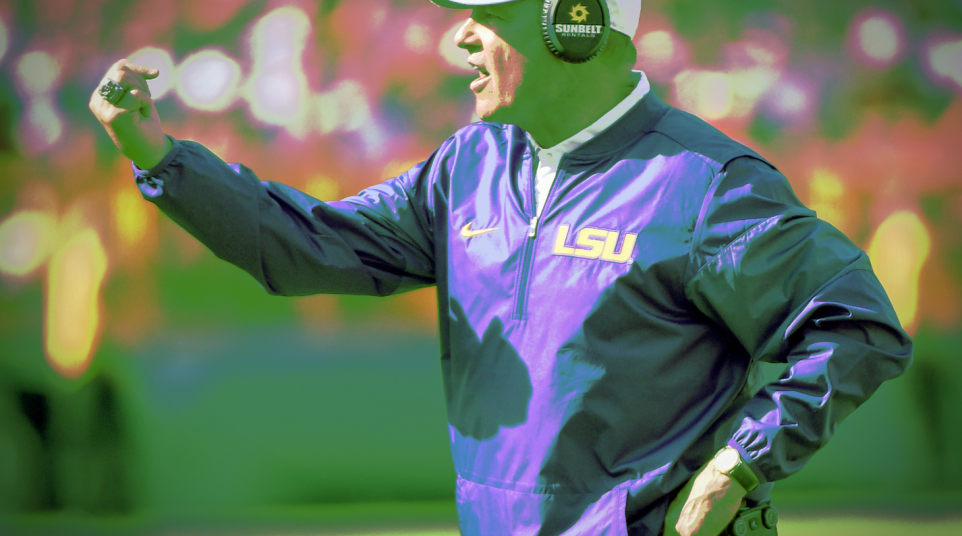
This isn't Les Miles' team, but with a few tweaks, it could have been
This isn’t Les Miles’ LSU team.
But it could have been.
Or at least something similar to it could have been.
Miles took over the LSU program that Nick Saban built and maintained an extremely high level of success. He won a national championship in his 3rd season.
Four years later his Tigers team put together the most impressive LSU regular season until this one.
That undefeated, No. 1-ranked team came up short in the title game, losing to Alabama, 21-0.
It remains to be seen whether Ed Orgeron’s team can finish the deal against No. 3 Clemson in the CFP Championship Game on Monday.
But somewhere Miles, who just completed his first season as Kansas’ head coach after being fired and replaced by Orgeron as LSU’s coach 4 games into the 2016 season, has to be wondering what might have been.
That 2011 team had one relative weakness and it was at the position that is this team’s biggest strength – quarterback.
If that 2011 team was ever going to lose – in the regular season, in the SEC Championship Game, in the BCS Championship Game – it was going to be because of shortcomings at quarterback.
That LSU team beat Alabama in Alabama without scoring a touchdown. It beat Georgia easily for the SEC championship despite passing for a mere 30 yards.
Then came the rematch against Alabama and the Achilles’ heel flared up.
The limitations of the offense, primarily the passing game, were the Tigers’ undoing. Everyone knew it. Many anticipated it.
Afterward, even Miles knew it. He made a change at offensive coordinator and brought in Cam Cameron from the NFL to enhance the passing aspect of the offense as LSU made the transition from the Jordan Jefferson/Jarrett Lee tandem to Zach Mettenberger, a strong-armed, pure pocket passer.
The passing game wasn’t much different in 2012. Mettenberger passed for 2,609 yards, some 500 more than Jefferson and Lee a year earlier, but had just 12 touchdowns, 9 fewer than the previous season.
In 2013, Mettenberger was more productive, passing for more than 3,000 yards and 22 touchdowns.
The offense was better and pointed in the same direction that everyone else was headed in offensively. But there was still a lot of catching up to do.
Miles never completely let go of the reins of the offense, allowing Cameron to drift toward territory Miles had only see from afar, but not stray far enough for Miles to leave his comfort zone.
LSU continued to play good defense and make marginal progress in the passing game, nominally hang in the SEC race until losing to Alabama on the first weekend in November, go to an unexciting bowl and finish somewhere around 10 wins all the while spinning their wheels.
Then came the 2-2 start in 2016 and Miles was gone and Orgeron was in. Orgeron did a nice enough job as interim head coach to get the full-time gig when nobody else seemed to really want it.
But Orgeron’s first 2 full seasons as head coach weren’t all that different than Miles’ last few full seasons as head coach – lots of good moments, a few bad ones, even fewer great ones, a nice defense, average and directionless offense.
Ho-hum.
But whereas Miles always seemed reluctant to change the offense, Orgeron seemed restless to keep changing it until he got it right.
He ditched Cameron right away and changed coordinators twice more before finally making a bold move last offseason – hiring a young unknown NFL assistant named Joe Brady to revolutionize the passing game.
Orgeron jumped full force into the deep end of a sea of change that Miles would merely dip a few toes into.
And here we are.
An LSU quarterback has won the Heisman Trophy. The Tigers have broken school, conference and national passing records over the course of a regular season even better than that 2011 masterpiece.
The change – the bold change in the passing game – was the final piece to the puzzle.
Miles is a disciple of legendary Michigan coach Bo Schembechler, whose teams played great defense and special teams, ran the ball extremely well and grudgingly accepted the fact that they needed to complete passes periodically.
It’s a formula that served Miles and LSU quite well for a long time. Miles is the 2nd-winningest coach in LSU history and won a national championship.
He could have done more. He tried to do more.
But when facing a 3rd-and-long to try and get his program back on track, he couldn’t bring himself to throw the ball past the 1st-down marker though he did resist the long-held temptation to run a draw play.
Ultimately he chose to run a screen pass.
